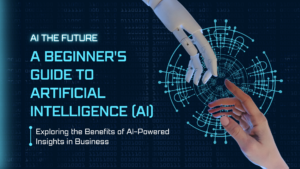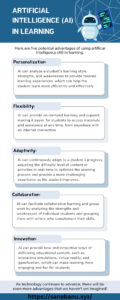A Beginner’s Guide to Artificial Intelligence (AI) best of 2024
A Beginner’s Guide to Artificial Intelligence (AI)
Introduction:
Artificial Intelligence (AI) has emerged as one of the most transformative technologies of the 21st century, revolutionizing industries, shaping our daily lives, and driving innovation across various domains. Despite its prevalence, understanding Artificial Intelligence (AI) can seem daunting for beginners. This beginner’s guide aims to demystify Artificial Intelligence(AI), providing a comprehensive overview of its concepts, applications, challenges, and ethical considerations.
Understanding Artificial Intelligence (AI) :
At its core, Artificial Intelligence (AI) refers to the simulation of human intelligence in machines, enabling them to perform tasks that typically require human intelligence. Artificial Intelligence (AI) includes learning, reasoning, problem-solving, perception, and language understanding. AI systems utilize algorithms, vast amounts of data, and computational power to analyze information, make decisions, and adapt to new inputs.
Types of Artificial Intelligence (AI):
Artificial Intelligence(AI) can be categorized into two broad types: Narrow AI (also known as Weak AI) and General AI (also known as Strong AI).
- Narrow AI: Narrow AI is designed to perform specific tasks or functions. Examples include virtual assistants like Siri or Alexa, recommendation systems used by streaming services, and image recognition algorithms.
- General AI: General AI refers to machines that possess human-like intelligence and can perform any intellectual task that a human being can. While this level of AI remains theoretical and isn’t currently achieved, it’s a subject of research and speculation within the AI community.
Machine Learning and Deep Learning
Machine Learning (ML) is a subset of Artificial Intelligence (AI) that enables systems to learn and improve from experience without explicit programming. Algorithms are trained on data, allowing them to make predictions or decisions. Deep Learning, a specialized field of ML, involves artificial neural networks inspired by the structure and function of the human brain. Deep Learning has led to significant advancements in areas like image and speech recognition, natural language processing, and autonomous vehicles.
Applications of Artificial Intelligence (AI)
Artificial Intelligence (AI) finds applications across diverse sectors:
- Healthcare: Artificial Intelligence (AI) aids in disease diagnosis, drug discovery, personalized medicine, and predictive analytics.
- Finance: Artificial Intelligence (AI) used for fraud detection, algorithmic trading, risk assessment, and customer service.
- Transportation: AI powers self-driving cars, traffic management systems, and logistics optimization.
- Education: AI-based tutoring systems, personalized learning platforms, and educational content creation.
- Retail: AI enhances customer experience through recommendation engines, inventory management, and chatbots.
Advanced Artificial Intelligence(AI) Techniques:
- Reinforcement Learning: This technique involves training AI agents to make sequences of decisions by learning from trial and error. It’s commonly used in robotics, game playing, and optimization problems.
- Natural Language Processing (NLP): NLP enables computers to understand, interpret, and generate human language. Applications include language translation, sentiment analysis, chatbots, and virtual assistants.
- Computer Vision: Artificial Intelligence (AI) systems equipped with computer vision can interpret visual information from images or videos. This technology is used in facial recognition, object detection, medical imaging, and autonomous vehicles.
Emerging Trends in Artificial Intelligence(AI):
- Explainable AI (XAI): As Artificial Intelligence (AI) becomes more sophisticated, there’s a growing need to understand and interpret its decision-making processes. XAI aims to make Artificial Intelligence (AI) systems more transparent and explainable, especially in critical domains like healthcare and finance.
- Edge AI: Edge computing involves processing data closer to the source (edge devices) rather than relying solely on centralized cloud servers. Edge AI enables faster decision-making and reduced latency for applications in IoT devices, smart appliances, and autonomous systems.
- Artificial Intelligence (AI) Ethics and Regulation: There’s an increasing focus on developing ethical guidelines and regulations to govern AI development and deployment. Initiatives are being undertaken to ensure AI systems are designed and used responsibly, addressing issues like bias, privacy, and safety.
Real-World Examples of Artificial Intelligence(AI) Impact:
- Healthcare Innovations: AI-powered diagnostic tools assist doctors in identifying diseases from medical imaging like X-rays and MRIs, improving accuracy and efficiency in diagnoses.
- Autonomous Vehicles: Companies are developing self-driving cars that use AI algorithms to perceive their environment, make decisions, and navigate safely on roads.
- Smart Assistants and Home Automation: AI-based virtual assistants like Google Assistant and smart home devices controlled by AI enhance convenience and efficiency in homes.
Education and Learning Resources:
- Online Courses: Platforms like Coursera, edX, and Udacity offer introductory courses in AI, Machine Learning, and Deep Learning for beginners.
- Open-Source Libraries and Tools: Tools like TensorFlow, PyTorch, and scikit-learn provide resources and frameworks for building AI models and applications.
- AI Communities and Forums: Engaging in online communities, forums, and meetups dedicated to AI can provide valuable insights, support, and networking opportunities for beginners.
Artificial Intelligence(AI) in Climate Change and Sustainability:
- Environmental Monitoring: AI technologies like satellite imagery analysis, drones, and sensor networks assist in monitoring environmental changes, deforestation, wildlife conservation, and climate patterns.
- Energy Efficiency: AI is employed in optimizing energy consumption, managing power grids, and developing smart energy systems, fostering renewable energy adoption and reducing carbon footprints.
Artificial Intelligence(AI) in Cybersecurity:
- Threat Detection: AI-powered cybersecurity systems use machine learning algorithms to detect and respond to cyber threats, identify patterns of suspicious activities, and strengthen network security.
- Fraud Prevention: AI helps in preventing fraud by analyzing vast amounts of data to identify anomalies in financial transactions and detect potential fraudulent activities.
AI and Creativity:
- Creative Applications: AI systems are increasingly used in creative fields such as art, music, and literature. Generative models, like GANs (Generative Adversarial Networks), produce artwork, compose music, and even write stories.
- Content Creation and Personalization: AI-driven tools enable content creators to automate tasks, generate personalized content, and tailor experiences based on user preferences in fields like marketing and entertainment.
Challenges and Ethical Considerations:
Despite its promise, Artificial Intelligence(AI) presents challenges and ethical considerations:
- Bias and Fairness: AI algorithms can inherit biases from the data they are trained on, leading to unfair or discriminatory outcomes.
- Privacy Concerns: The collection and analysis of vast amounts of personal data raise concerns about privacy infringement.
- Job Displacement: Automation driven by AI could lead to job displacement in certain sectors, necessitating the need for re-skilling and upskilling.
- Ethical Decision Making: AI systems making autonomous decisions raise questions about accountability and ethical decision-making processes.
Conclusion:
Artificial Intelligence(AI) continues to evolve and permeate various aspects of our lives. Understanding its fundamentals is crucial for navigating the future landscape shaped by AI-driven technologies. As beginners delve deeper into this field, it’s essential to embrace its potential while being mindful of the ethical implications and societal impacts. With responsible development and thoughtful application, AI holds the promise of solving complex problems and augmenting human capabilities in unprecedented ways.
Another interesting blog you can check it out here
What is Artificial Intelligence (AI)?
Explanation of AI as a field of computer science aiming to create intelligent machines capable of simulating human-like cognitive abilities.
What are the different types of AI?
Explaining the categories of AI: Narrow or Weak AI (focused on specific tasks) and General or Strong AI (possessing human-level intelligence across various tasks).
How does AI impact our daily lives?
Explaining how AI influences everyday activities, including personalized recommendations, virtual assistants, autonomous vehicles, and smart home devices.


